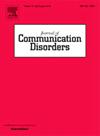Bibliometric analysis, systematic review of literature, and meta-analysis on the effect of amplification on voice production among teachers
IF 2.1
3区 医学
Q2 AUDIOLOGY & SPEECH-LANGUAGE PATHOLOGY
引用次数: 0
Abstract
Background
Teaching is identified as a high-risk profession for developing voice disorders due to the significant vocal demands placed on educators. This can lead to symptoms such as vocal fatigue, adversely affecting their quality of life. One common intervention is the provision of voice amplification systems, which have been reported to reduce vocal strain by enabling teachers to speak at lower volumes, thereby potentially improving voice quality and minimizing vocal fold damage. Despite these benefits, various factors such as adoption rates, technical issues, and the need for proper use and training can influence the effectiveness of these systems. This study systematically reviews the literature and conducts a meta-analysis to determine the impact of voice amplification on teachers' vocal function.
Methods
The results reported in this manuscript are based on a bibliometric analysis and systematic literature review using seven databases, selecting 20 relevant publications from an initial pool of 462, and performing a meta-analysis to compare vocal metrics with and without amplification.
Results
The meta-analysis indicated that voice amplification systems tend to positively affect fundamental frequency, sound pressure level (SPL), and phonation time percentage; however, these effects were not statistically significant. The analysis also suggests no significant publication bias, though the quality of the included publications varied: 15 % were rated as strong, 25 % as moderate, and 60 % as weak.
Conclusion and Recommendations
The study concludes that voice amplification systems show potential benefits for teachers' vocal health. However, their implementation should be part of a broader strategy that includes education, training, and regular monitoring to maximize their effectiveness.
文献计量学分析、文献系统回顾与元分析:扩音对教师发声的影响
教学被认为是一个高风险的职业发展的声音障碍,由于显著的声音要求对教育者。这可能导致声带疲劳等症状,对他们的生活质量产生不利影响。一种常见的干预措施是提供声音放大系统,据报道,这可以通过使教师以较低的音量说话来减少声音紧张,从而潜在地提高声音质量并最大限度地减少声带损伤。尽管有这些好处,诸如采用率、技术问题以及对适当使用和培训的需要等各种因素可能会影响这些系统的有效性。本研究系统地回顾文献并进行meta分析,以确定声音放大对教师发声功能的影响。方法本文报告的结果是基于文献计量学分析和系统文献综述,使用7个数据库,从462个初始池中选择20个相关出版物,并进行荟萃分析,比较有和没有放大的声音指标。结果meta分析表明,声音放大系统对基本频率、声压级(SPL)和发声时间百分比有正向影响;然而,这些影响在统计学上并不显著。分析还表明,虽然纳入的出版物的质量各不相同,但没有显著的发表偏倚:15%被评为强,25%被评为中等,60%被评为弱。结论和建议研究得出结论,声音放大系统对教师的声音健康有潜在的好处。然而,它们的实施应该是更广泛战略的一部分,该战略包括教育、培训和定期监测,以最大限度地提高其有效性。
本文章由计算机程序翻译,如有差异,请以英文原文为准。
求助全文
约1分钟内获得全文
求助全文
来源期刊

Journal of Communication Disorders
AUDIOLOGY & SPEECH-LANGUAGE PATHOLOGY-REHABILITATION
CiteScore
3.30
自引率
5.90%
发文量
71
审稿时长
>12 weeks
期刊介绍:
The Journal of Communication Disorders publishes original articles on topics related to disorders of speech, language and hearing. Authors are encouraged to submit reports of experimental or descriptive investigations (research articles), review articles, tutorials or discussion papers, or letters to the editor ("short communications"). Please note that we do not accept case studies unless they conform to the principles of single-subject experimental design. Special issues are published periodically on timely and clinically relevant topics.
 求助内容:
求助内容: 应助结果提醒方式:
应助结果提醒方式:


